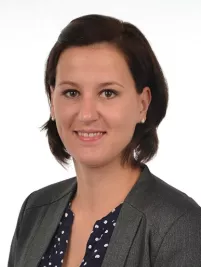Institute for Safety and Security Research (ISF)
Current PhD Theses


Matthias Muhr
Foschungsprojekt am Institut für Detektionstechnologien (IDT)
Rheinbach
Room: G 114
Telephone: +49 2241 865 9892
Newly synthesized chemicals or products that pose an explosion hazard in their pure form or as a mixture pose a safety risk without adequate characterization and classification. Classically, such substances are characterized using a variety of conventional test methods that require handling relatively large sample quantities. The aim of Matthias Muhr's PhD project is to develop a testing apparatus that enables a more precise characterization of such substances by sensory monitoring of these conventional methods. In doing so, the sample quantities are to be significantly reduced in order to significantly lower the safety risk during handling.

Markus Rohde
PhD Student, Project Digital Fellowship International
Sankt Augustin
Room: B027
Telephone: +49 2241 865 9827
In recent years, 3D cameras based on the time-of-flight method - also driven by their use in smartphones - have increasingly found their way into our everyday lives. The possible applications of this technology are immense - automatic environment detection in the automotive sector, safety and automation functions in robotics, tasks of automatic area monitoring, biometric problems or the contactless control of technical devices. The aim of M. Rohde's research is to improve these cameras for the use in biometric or outdoor applications. Supervision: Prof. Dr. Robert Lange

Sara Schäfer
Scientific staff member, doctoral candidate
Rheinbach
Room: G 111
Telephone: +49 2241 865 521
Due to its unique properties, ultrapure water is used as a solvent or starting product for pharmaceuticals as well as for cleaning surfaces during manufacture of high-precision components in semiconductor production. Monitoring the quality of the water is of utmost importance here. S. Schäfer is developing a universal measuring device for monitoring ultrapure water quality, combining oxidation by ozonation in combination with UV radiation. This leads to an extended oxidation process and a significant increase in oxidation power compared to conventional systems. Supervisor: Prof. Dr. P. Kaul

Sarah Vermeeren
Research Associate, M.Sc.
Rheinbach
Room: K210 R
Telephone: + 49 2241 865 9835
Potato cancer, caused by the potato fungus Synchytrium endobioticum (Schilb.) Perc. is one of the most important pests of potatoes (quarantine status in the EU). Therefore, early detection and containment is extremely important. S. Vermeeren analyses the volatile organic compound (VOC) profiles of potato plants, potatoes and residual soil using thermodesorption gas chromatography-mass spectrometry (TD-GC-MS) and proton transfer reaction time-of-flight mass spectrometry (PTR-ToF-MS), with the aim of being able to distinguish between healthy and infected states. Supervisor: Prof. Dr. P. Kaul
Externe Promovierende
Rene Breuch
Unerwünschte Bakterien in der Lebensmittelindustrie sind ein Problem, und sie zu detektieren ist eine besondere Herausforderung. Doktorand Rene Breuch erforscht, wie man mit Hilfe der oberflächen-verstärkenden Raman-Spektroskopie (SERS) solche Bakterien rechtzeitig erkennen kann. Dabei detektiert und differenziert er Verderbs-Bakterien durch die gezielte Entwicklung strapazierfähiger SERS-Substrate basierend auf Goldnanopartikeln, geeigneten Methoden zur Probennahme und multivariater Statistik.
Betreuung: Prof. Dr. Peter-Michael Kaul
Lukas Pschyklenk
Flüssigkristalle kennt man in der Regel nur von Displays (LCD). Dabei können die außergewöhnlichen optischen Eigenschaften dieser faszinierenden Substanzen für diverse Anwendungen genutzt werden. Eine davon ist die Gassensorik. Eine spezielle flüssigkristalline Phase, die durch Dotierung mit optisch aktiven Substanzen entsteht, reflektiert ähnlich wie die Flügel eines Schmetterling nur einen schmalen Wellenlängenbereich des einfallenden Lichtes zurück. Für den Beobachter erscheint der Flüssigkristall dann in einer sehr intensiven Farbe. Für die Farbe ist jedoch kein Farbstoff, sondern nur die Struktur des Flüssigkristalles verantwortlich. Durch eine chemische Reaktion des Dotiermittels mit einer zu detektierenden Substanz ändert sich diese Struktur und damit augenblicklich die sichtbare Farbe. Zur Detektion von Substanzen entwickelt Doktorand Lukas Pschyklenk einen Gassensor, der keinerlei Stromverbrauch aufweist und mit bloßem Augen ausgelesen werden kann. Das Promotionsvorhaben ist mit dem BMBF-Projekt OptoSpin verbunden. Ziel des Projektes ist das Finden geeigneter Dotiermittel für ausgewählte sicherheitsrelevante Substanzen sowie die Verbesserung der Anwendbarkeit dieser Sensoren.
Betreuung: Prof. Dr. Peter-Michael Kaul
Johannes Warmer
Doktorand Johannes Warmer beschäftigt sich in seiner Promotion mit der Entwicklung eines Sensorsystems für die Detektion von Triacetontriperoxid (TATP), einem hochbrisanten Sprengstoff der mehrfach von Terroristen für Anschläge eingesetzt wurde. In seiner Arbeit befasst er sich vornehmlich mit sogenannten Metalloxid-Halbleitergassensoren, die sich bei geringen Anschaffungskosten durch eine sehr hohe Empfindlichkeit aber niedrige Selektivität auszeichnen. Um den Nachteil der mangelnden Selektivität auszugleichen, gilt es, die Sensorperformance durch die Auswahl geeigneter Materialien und Betriebsweisen des Sensors zu optimieren. Im Rahmen der Promotion wird hierbei von der Fertigung des eigentlichen Sensors über die Entwicklung geeigneter Signalverarbeitungsstrategien versucht durch die Kombination verschiedener spektroskopischer und elektrischer Messverfahren nicht nur die Einsatztauglichkeit eines solchen Sensorsystems zu realisieren, sondern auch die zugrundeliegenden chemischen Oberflächenreaktionen zu formulieren. Ziel ist es, ein tieferes Verständnis für den eigentlichen sensorischen Mechanismus zu erlangen.
Betreuung: Prof. Dr. Peter-Michael Kaul